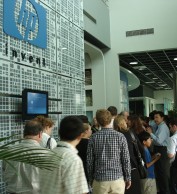Gordon in the News: last updated 10/24/2008
MEDIA CONTACT Jo Kadlecek
Office of College Communications
978.867.4569
[email protected]
WENHAM, MA - With the international spotlight on China this week and the XXIX Olympic Games underway, many are waiting to catch a glimpse of a country that has often seemed bleak or secretive. But Gordon College economics professor, Stephen Smith, who toured China in May and June along with 11 Gordon students, believes the attention has already been a healthy thing for the Chinese people.
"As we visited six cities in eighteen days, we saw a deep national pride that the Olympics were coming to Bejing," Smith said. "Factory workers, tour guides, business men, everyone we encountered, were excited. There's great significance attached to the Games."
Along with colleagues and graduate students from California-based Biola University, (which co-sponsored the international seminar entitled, "Economic Development and Modern China"), Smith and his students toured eight factories, listened to six academic lectures from Chinese scholars and participated in various cultural, economic and historical events. Each aspect of the tour exposed the group to what Smith called, "the Olympic national pride," and many people told him that such pride came as a result of Chinese accomplishments over the past thirty years.
"Most people we talked with felt that the world had affirmed their country (with the Olympics), that they are making sort of a 'comeback' on the international stage," Smith said. "They felt that whatever problems there had been, such as environmental concerns, were solvable."
The Games also coincide with a shift in the economy throughout China. Smith, an international trade specialist who last summer presented a paper at the Federal Reserve in Washington, D.C., said that over the past decade China's image as a manufacturer of inexpensive global goods has been changing. The country is no longer only a low-tech manufacturing center offering low wages to its workers, but its work force is rapidly changing in large part because the Chinese government has promoted higher education. More college-age young people are on track to earn diplomas than ever before and as a result, Smith believes the entire Chinese economy is experiencing an upgrade of quality products, better wages, and high-tech jobs.
"Factories that are depending on low-wage jobs are struggling to make it," he said. "What we found on our tour was that low tech manufacturing firms are having to adopt to new technologies. Ultimately, that's good for China, and though it might be stressful in the short term, it will be good in the long term for them and those countries (like the U.S.) who trade with them."
The point of the co-sponsored trip was two-part, Smith said: to study China's economic development by visiting factories and businesses, and to survey spiritual changes by attending several types of churches. Smith cited specific interactions with some business leaders who reported how their Christian faith informed their work.
"Some of China's leading business leaders are Christians," Smith said. "And other spiritual changes are being driven mostly in the cities by young urban professionals."
With such economic changes underway, the Bejing Olympics have become symbolic of a new kind of competition and status for the eastern country. And, as Smith put it, "China's economic emergence is exactly what we could have hoped for twenty years ago. The implications for the world are great. When China's economy is strong, their opportunities for innovation will be too. And everyone wins."
Gordon College is a Christian college of the liberal arts and sciences on Boston's North Shore. The college offers majors in 37 fields and has graduate programs in education and music education. Leading the way in Christian college merit, Gordon is nationally ranked for its excellence in academics and its role in character building. These achievements recognize Gordon as one of the nation's top Christian colleges.
